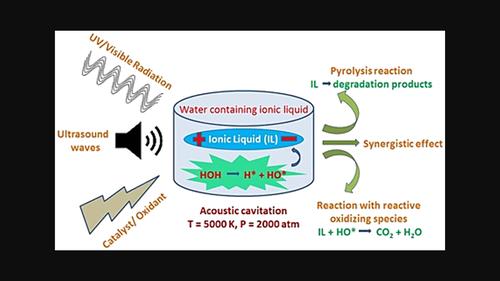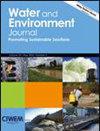Acoustic cavitation oxidation of ionic liquids: A brief review
IF 1.8
4区 环境科学与生态学
Q4 ENVIRONMENTAL SCIENCES
引用次数: 0
Abstract
Ionic liquids (ILs) are third-generation materials with broad industrial applications. However, their toxicity, non-biodegradability and water solubility render them persistent water pollutants. Consequently, IL degradation from water is an emerging topic of research interest nowadays. Sonolysis is one of the advanced oxidation processes (AOPs) based on ultrasound (US). During sonolysis, acoustic cavitation decomposes water into reactive hydroxyl (•OH) and hydrogen (•H) radicals, which then oxidize IL. This review discussed different AOPs for wastewater treatment reflecting their shortcomings, with a special focus on the operating conditions and effectiveness of US-based hybrid AOPs for IL degradation. The synergistic effects of US over other AOPs are investigated. Hybid-sonolysis has proven to significantly enhance IL mineralization in shorter reaction time by generating more reactive-free radicals in an aqueous medium at experimentally optimized conditions. Finally, this review identifies research gap and proposes future directions of IL degradation. It will serve as a valuable resource for future studies of IL degradation using US techniques.

离子液体的声空化氧化:简要回顾
离子液体(ILs)是第三代材料,具有广泛的工业用途。然而,其毒性、不可生物降解性和水溶性使其成为持久性水污染物。因此,从水中降解离子液体是当今一个新兴的研究课题。声解是基于超声波(US)的高级氧化工艺(AOPs)之一。在声解过程中,声空化作用会将水分解成活性羟基(-OH)和氢(-H)自由基,进而氧化 IL。本综述讨论了用于废水处理的不同 AOP,反映了它们的不足之处,并特别关注了基于 US 的混合 AOP 在降解 IL 方面的操作条件和有效性。研究了 US 与其他 AOPs 的协同效应。事实证明,在实验优化的条件下, Hybid-sonolysis 能在水介质中产生更多活性自由基,从而在更短的反应时间内显著提高 IL 矿化度。最后,本综述指出了IL降解方面的研究空白,并提出了未来的研究方向。它将成为今后利用 US 技术研究 IL 降解的宝贵资料。
本文章由计算机程序翻译,如有差异,请以英文原文为准。
求助全文
约1分钟内获得全文
求助全文
来源期刊

Water and Environment Journal
环境科学-湖沼学
CiteScore
4.80
自引率
0.00%
发文量
67
审稿时长
18-36 weeks
期刊介绍:
Water and Environment Journal is an internationally recognised peer reviewed Journal for the dissemination of innovations and solutions focussed on enhancing water management best practice. Water and Environment Journal is available to over 12,000 institutions with a further 7,000 copies physically distributed to the Chartered Institution of Water and Environmental Management (CIWEM) membership, comprised of environment sector professionals based across the value chain (utilities, consultancy, technology suppliers, regulators, government and NGOs). As such, the journal provides a conduit between academics and practitioners. We therefore particularly encourage contributions focussed at the interface between academia and industry, which deliver industrially impactful applied research underpinned by scientific evidence. We are keen to attract papers on a broad range of subjects including:
-Water and wastewater treatment for agricultural, municipal and industrial applications
-Sludge treatment including processing, storage and management
-Water recycling
-Urban and stormwater management
-Integrated water management strategies
-Water infrastructure and distribution
-Climate change mitigation including management of impacts on agriculture, urban areas and infrastructure
 求助内容:
求助内容: 应助结果提醒方式:
应助结果提醒方式:


